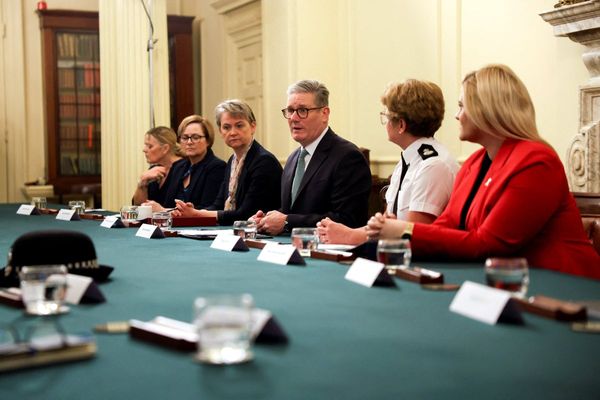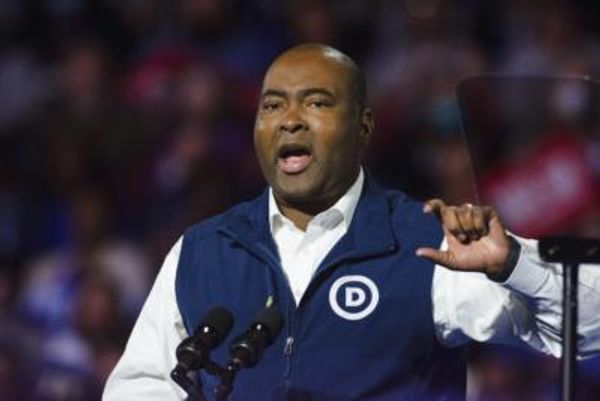WASHINGTON _ President Donald Trump has a lot of questions about how his Senate impeachment trial _ only the third in history _ will unfold. He's turning to one man for answers.
Eric Ueland has been working late nights in the West Wing, colleagues say, preparing for a litany of scenarios and arcane procedural challenges that could face the president now that articles of impeachment have been formally submitted to the Senate.
He is not a household name like many others in Trump's inner circle. But Ueland, the White House director of legislative affairs, has emerged as the administration's main point man for navigating impeachment in both chambers.
His background has proved especially relevant in the Senate, where Republicans are in control and must balance institutional limitations with the ambitions of the White House.
"I am happy to be deployed however the president chooses," Ueland told McClatchy earlier this week while walking the halls of Congress, where he has become a regular presence. "The president selected to use me in this role in a variety of instances, including on the issue of impeachment."
Ueland has advised Trump since the presidential transition period, joining his team after serving for years as the staff director on the Senate Budget Committee _ an important position on Capitol Hill but relatively obscure outside of Washington circles.
Initially, Trump and his top aides viewed Ueland as a managerial figure, nominating him unsuccessfully to serve as undersecretary of State for management in 2017. But his contacts and institutional knowledge of Congress have in recent months served a more strategic purpose. He was named to the current White House post last summer.
"He brings a calm, strategic approach, and is effectively working with members of Congress to accomplish President Trump's objectives," said Jared Kushner, the president's senior adviser and son-in-law.
Four senior administration officials said that, from the top down, the White House is relying on Ueland and Jeffrey Freeland, another legislative affairs official, to anticipate the twists and turns as the Senate proceeds with a rare constitutional trial to determine the fate of Trump's presidency.
Ueland has been fielding a range of questions, including on trial motions, executive privilege and the role of John Roberts, the Supreme Court chief justice constitutionally mandated to preside over the case.
"He has incredible relationships in Congress, as well as knowing the procedures _ a vast knowledge of the procedures," said Pam Bondi, a senior adviser to the president on impeachment and former attorney general of Florida. "Any question regarding procedure, in either chamber, goes to him."
Ueland is also a veteran of the previous impeachment trial. As chief of staff to former Senate Majority Whip Don Nickles, R-Okla., during President Bill Clinton's impeachment trial in 1999, he was known for citing precedent from President Andrew Johnson's impeachment proceedings in 1868.
"He is perfect for this place at this time because he understands the Senate and he understands history," said Nickles, who now runs his own government relations firm.
It is a high-stakes position for a low-key figure who claims he is more interested in substance than spotlight.
Ueland was described by one official as "stoic" and by another as a "calming factor" in Oval Office meetings with the president on what to expect of impeachment, largely unfazed by Trump's emotional responses to the events of the day.
But his "unchanging demeanor," as Bondi described it, does not necessarily make him timid. It was Ueland, not White House counsel Pat Cipollone, who drafted a fiery six-page letter to House Speaker Nancy Pelosi last month accusing her of undermining the 2020 presidential election by launching the impeachment probe.
"We're here to make the case on behalf of the president by ensuring that all his rights are protected," Ueland told reporters earlier this week, when asked whether Trump was still pushing for a Senate vote on a motion to dismiss the charges against him.
Senior congressional Democrats said they haven't had much interaction _ if any _ with Ueland since he joined the White House team, a sign that Ueland serves more as a liaison to the Republican caucus than to Congress as a whole.
"I guess I'm not senior enough for him to talk to," quipped Sen. Patrick Leahy of Vermont, the most senior member of the Senate by length of tenure and the top Democrat on the Senate Appropriations Committee. "I wouldn't know the man if I saw him walking down the hall."
Ueland was also less involved in day-to-day strategizing during the House impeachment proceedings, said House Minority Whip Steve Scalise, R-La. The Republican minority in the House had little leverage to promote Trump's case through parliamentary motions.
In the Senate, where Republicans hold the majority, Ueland has been serving as an envoy for a president to help navigate the chamber's thorny procedural landmines.
"It's a different animal, now, dealing with senators who are technically acting as jurors and may not be as amenable to a legislative affairs or communications guy coming to talk to them," said one White House official.
Ueland also has the stamp of approval from Senate Majority Leader Mitch McConnell, with whom he has a direct line of communication.
"The leader and his staff trust and rely on him," said a senior Senate Republican leadership aide. "He understands what makes the Senate tick."
Ueland's engagement with Senate Republicans ramped up late last year as House Democrats made clear they planned to impeach Trump.
He was the only other White House attendee at a pivotal meeting in December between Cipollone and McConnell _ after which the Kentucky Republican went on Fox News and declared "total coordination" with the administration on legal strategy.
As the start of the Senate trial neared, Ueland spoke with Senate Republicans in smaller groups and at weekly closed-door member lunches to share Trump's latest demands on witness testimony.
And while he is viewed as a credible vehicle of Trump's wishes, Senate Republicans believe that Ueland _ knowing the Senate as he does _ must understand that many of the president's requests are unrealistic, given how the chamber operates.
Ueland is not serving as a congressional arm-twister for the administration. Sen. Mitt Romney of Utah, one Republican likely to defect on procedural votes during the upcoming impeachment trial, confirmed to McClatchy earlier this week that Ueland had not contacted him.
Ueland told McClatchy he often goes to lawmakers with specific messages from the Oval Office. That is expected to continue during the Senate trial that is scheduled to begin on Tuesday.
He demurred, however, when asked whether informing Trump about Senate procedures _ and the president's limited ability to influence them _ has become a core part of his job.
"I'm always happy to answer whatever question the president has about strategy, tactics, people, personnel, policy, politics, press, and I will continue to do that throughout my time at the White House as he chooses to use me," Ueland said.
"But my job is to serve on his behalf as his advocate here on the Hill, serve as continued communicator on his behalf with members up here on the Hill and press his agenda," he said. "And I'll keep doing that."







